Athlete advocacy plays a vital role in driving social change and promoting justice. This article explores how athletes leverage their platforms to address issues like racial inequality, mental health, and environmental sustainability. It examines the impact of their efforts on community engagement, the challenges they face, and the organizations that support their initiatives. Lastly, it discusses the future of athlete advocacy in shaping sports culture and societal values.
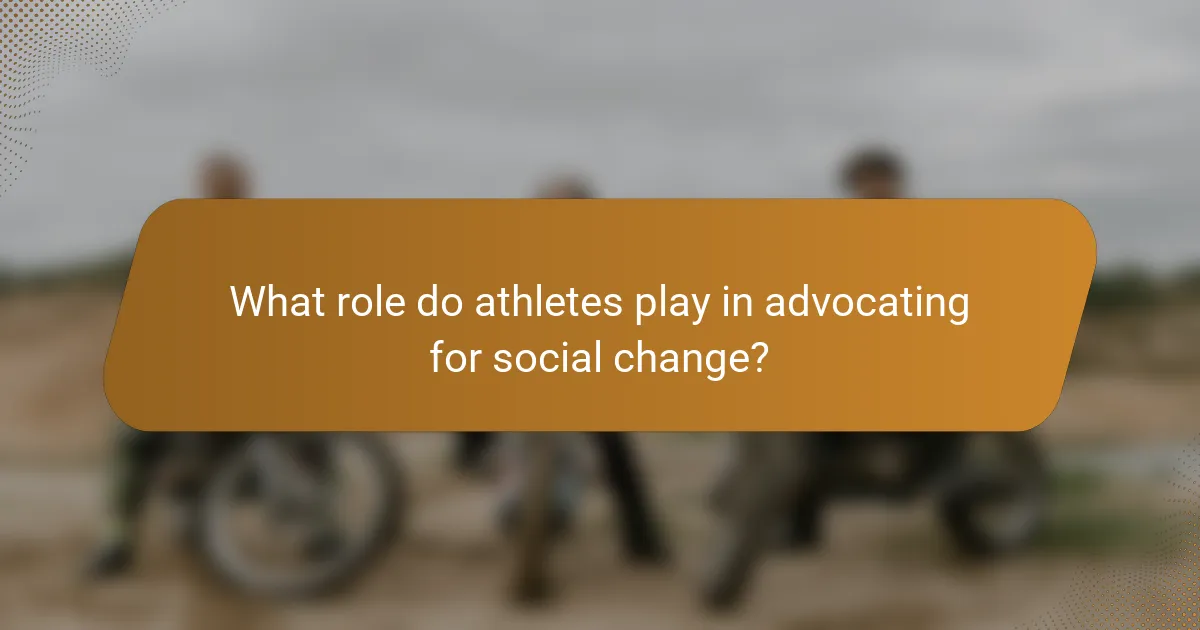
What role do athletes play in advocating for social change?
Athletes play a crucial role in advocating for social change by leveraging their platforms to raise awareness and promote justice. They influence public opinion and inspire action through their visibility and credibility. For instance, athletes like Colin Kaepernick and LeBron James have addressed issues such as racial inequality and police brutality, mobilising fans and communities to engage in activism. Their efforts often lead to significant discussions and initiatives aimed at creating a more equitable society.
How do athletes influence public opinion on social issues?
Athletes significantly shape public opinion on social issues through their visibility and influence. They leverage their platforms to advocate for causes, raise awareness, and inspire change.
For example, athletes like Colin Kaepernick have sparked national conversations on racial injustice. Their actions often resonate with fans, leading to increased public discourse. Research shows that 75% of sports fans believe athletes should speak out on social issues, highlighting their potential impact.
Moreover, athlete-led initiatives, such as community outreach programmes, amplify their advocacy. These efforts often address issues like education, health, and equality. As a result, athletes not only influence public opinion but also drive social change through direct engagement.
Which athletes are leading the charge in advocacy efforts?
Athletes leading advocacy efforts include LeBron James, Colin Kaepernick, and Naomi Osaka. These individuals champion social justice, racial equality, and mental health awareness in sports. LeBron James focuses on educational initiatives through his foundation, while Colin Kaepernick raises awareness on police brutality. Naomi Osaka advocates for mental health, emphasising the importance of athlete well-being. Their efforts inspire others in the sports community to engage in social responsibility.
What platforms do athletes use for advocacy?
Athletes use social media, advocacy organisations, and community events for advocacy. Platforms like Twitter, Instagram, and Facebook allow athletes to share their messages widely. Organisations such as the Players Coalition and the Women’s Sports Foundation help amplify their voices. Community events provide opportunities for direct engagement with fans and supporters.
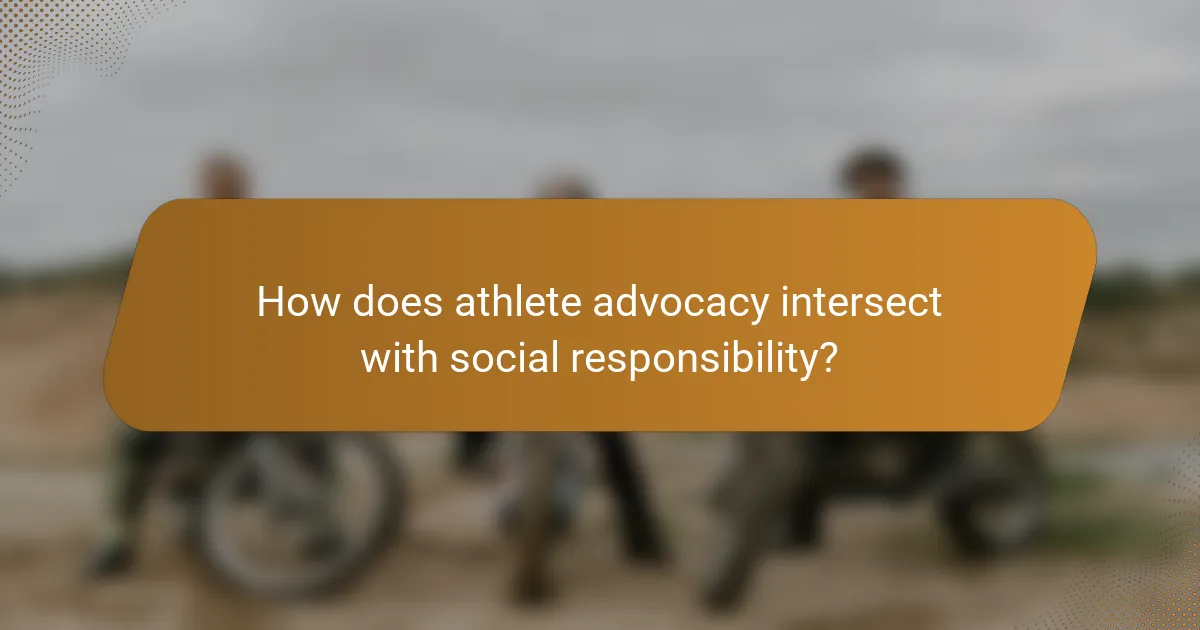
How does athlete advocacy intersect with social responsibility?
Athlete advocacy significantly intersects with social responsibility by empowering athletes to address societal issues. Athletes leverage their platforms to raise awareness on topics like equality, mental health, and environmental sustainability. This advocacy fosters community engagement and promotes positive change, enhancing the social responsibility of sports organisations. As a result, athletes not only inspire fans but also influence policy and cultural norms, demonstrating the unique role they play in societal development.
What are the key responsibilities of athletes as public figures?
Athletes have key responsibilities as public figures, including advocating for social issues, serving as role models, and promoting healthy lifestyles. They influence public opinion and can drive positive change in society.
Athletes often use their platforms to raise awareness about critical issues, such as racial equality, mental health, and environmental sustainability. For example, many athletes participate in campaigns that support underprivileged communities, demonstrating their unique position to effect change.
Additionally, athletes are expected to maintain a positive public image and uphold sportsmanship values. This responsibility includes engaging with fans and the media in a respectful manner, which can enhance their influence and inspire future generations.
Finally, athletes contribute to charitable initiatives by leveraging their fame. Many establish foundations or partner with organisations to address social challenges, showcasing their commitment to community welfare.
How do athletes balance personal branding with social causes?
Athletes balance personal branding with social causes by integrating their advocacy into their public personas. They leverage their platforms to raise awareness while enhancing their brand image.
Many athletes, like LeBron James and Colin Kaepernick, use their influence to address social issues. This dual focus can attract sponsors aligned with their values, creating a win-win situation.
The unique attribute of athlete advocacy lies in its ability to resonate with fans, fostering loyalty and community support. As a result, athletes can drive social change while maintaining their brand relevance.
Effective strategies include collaborating with non-profits and engaging in public speaking. These actions not only amplify their message but also solidify their commitment to positive societal impact.

What impact does athlete advocacy have on communities?
Athlete advocacy positively impacts communities by promoting social change, raising awareness, and inspiring action. Athletes leverage their platforms to address issues such as inequality, health, and education. For instance, initiatives led by athletes can lead to increased funding for local programmes and greater community engagement. As a result, these efforts foster a sense of unity and empowerment among community members, enhancing overall social responsibility in sports.
How do local initiatives benefit from athlete involvement?
Local initiatives benefit significantly from athlete involvement through increased visibility, community engagement, and resource mobilisation. Athletes often serve as role models, inspiring local youth to participate in sports and healthy activities. Their presence can attract media attention, fostering awareness and support for community projects. Additionally, athletes can leverage their platforms to raise funds and resources, enhancing the effectiveness of local programmes. As a result, communities experience improved social cohesion and access to sports opportunities.
Which social issues are most commonly addressed by athletes?
Athletes commonly address social issues such as racial equality, mental health awareness, gender equality, environmental sustainability, and community development. These topics reflect their commitment to social responsibility and influence public discourse. Athletes leverage their platforms to advocate for change, highlighting the importance of these issues in society.
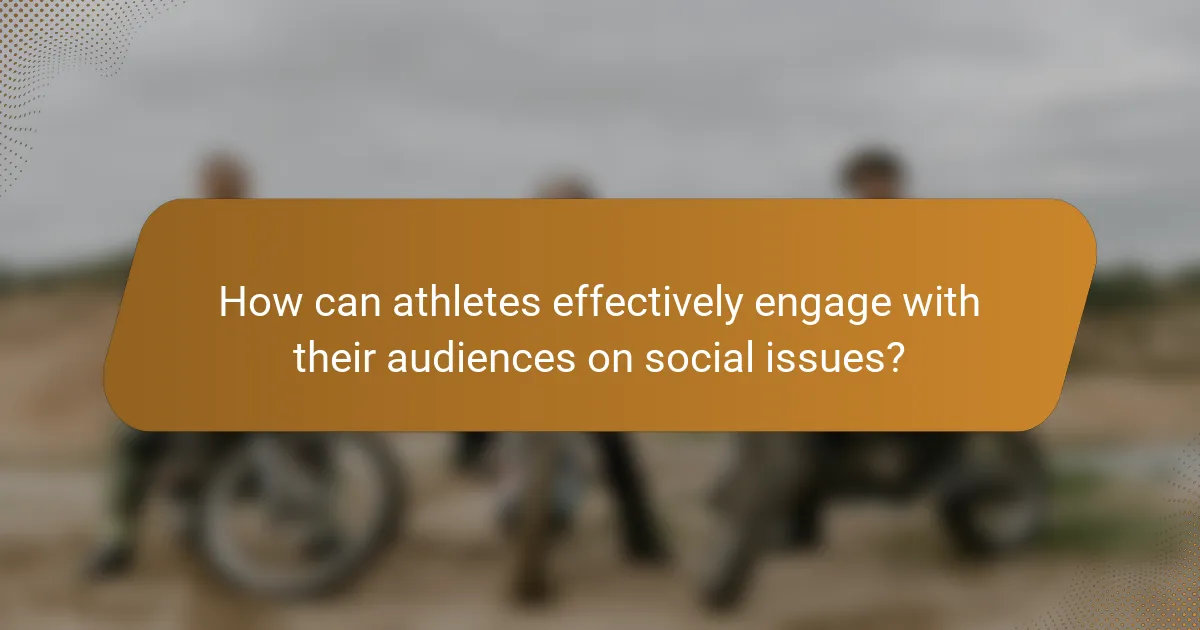
How can athletes effectively engage with their audiences on social issues?
Athletes can effectively engage with their audiences on social issues by leveraging their platforms and authenticity. They should share personal experiences, collaborate with organisations, and use social media to amplify their messages.
Engagement can include participating in community events, hosting discussions, and using storytelling to connect emotionally with fans. Transparency about their beliefs fosters trust and encourages dialogue.
Additionally, athletes can advocate for specific causes by aligning with initiatives that resonate with their values, thereby inspiring their audience to take action. Consistency in messaging reinforces their commitment to social responsibility.
What communication strategies resonate with fans?
Athlete advocacy and social responsibility strategies that resonate with fans include authenticity, community engagement, and transparency. Athletes who share personal stories and experiences foster a genuine connection. Engaging with local communities through events or initiatives strengthens ties and builds loyalty. Transparency in actions and intentions enhances trust, encouraging fans to support causes aligned with their values.
How do cultural differences shape athlete advocacy approaches?
Cultural differences significantly influence athlete advocacy approaches. Diverse backgrounds shape how athletes perceive social responsibility and engage with their communities.
For instance, athletes from collectivist cultures may prioritise community welfare over individual recognition. They often advocate for social issues that resonate with their cultural values, such as education and equality. In contrast, athletes from individualistic cultures might focus on personal achievements and use their platforms to raise awareness on issues like mental health and personal freedom.
Moreover, the historical context of a region affects advocacy. Countries with a history of social movements may see athletes taking more active roles in political discourse. This can lead to unique advocacy strategies tailored to their specific cultural narratives and societal needs.
Understanding these cultural nuances is essential for developing effective athlete advocacy programmes that resonate with diverse audiences.
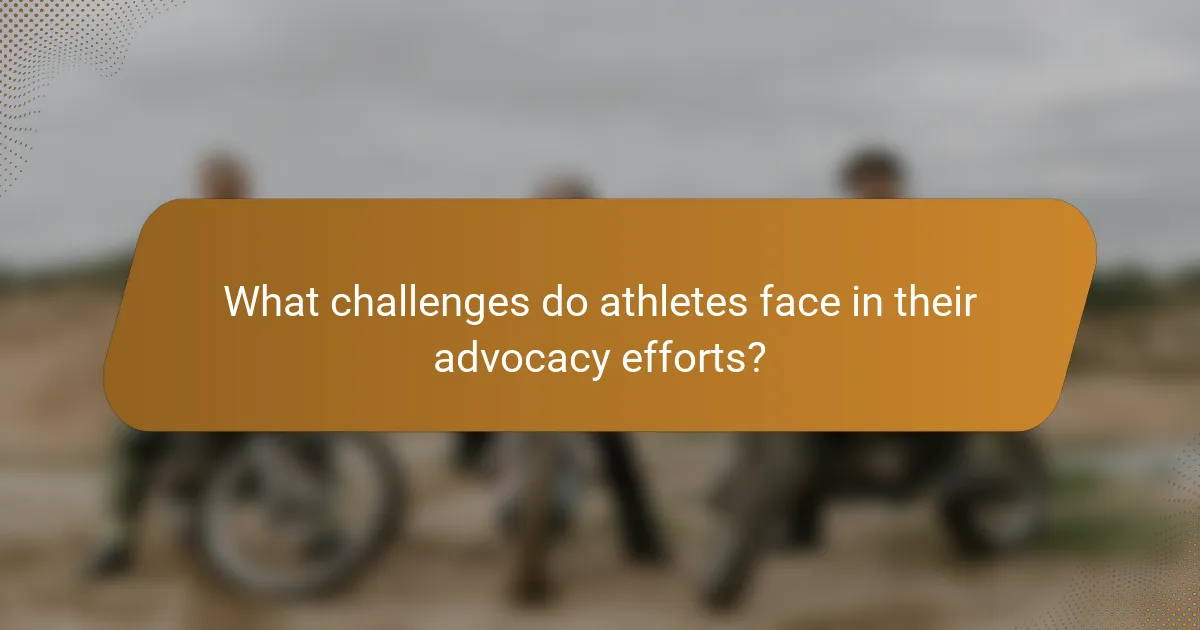
What challenges do athletes face in their advocacy efforts?
Athletes face significant challenges in their advocacy efforts, including public scrutiny, limited platforms, and potential backlash. They often contend with the risk of losing sponsorships and support from organisations. Additionally, navigating complex social issues can create divisions among fans and stakeholders. These factors can hinder their ability to effect change and raise awareness effectively.
How do sponsorships and endorsements influence athlete advocacy?
Sponsorships and endorsements significantly enhance athlete advocacy by amplifying their messages and causes. Financial support from brands allows athletes to focus on social issues, increasing visibility and engagement.
Athletes often leverage their platforms to advocate for social justice, health awareness, and environmental sustainability. For instance, high-profile endorsements can lead to broader media coverage, influencing public opinion.
Moreover, brands that align with athletes’ values can create authentic partnerships, fostering a sense of community and shared responsibility. This collaboration can effectively mobilise fans and followers toward meaningful action.
As a result, the intersection of sponsorship and advocacy transforms athletes into powerful agents of change, promoting social responsibility within sports.
What risks do athletes encounter when speaking out?
Athletes face significant risks when speaking out, including backlash from fans, sponsors, and teams. These risks can lead to loss of endorsements, strained relationships, and potential career setbacks. Additionally, athletes may encounter social media harassment and threats. Fear of isolation within their sport can also deter athletes from voicing concerns. Ultimately, the pressure to conform can silence important advocacy efforts.
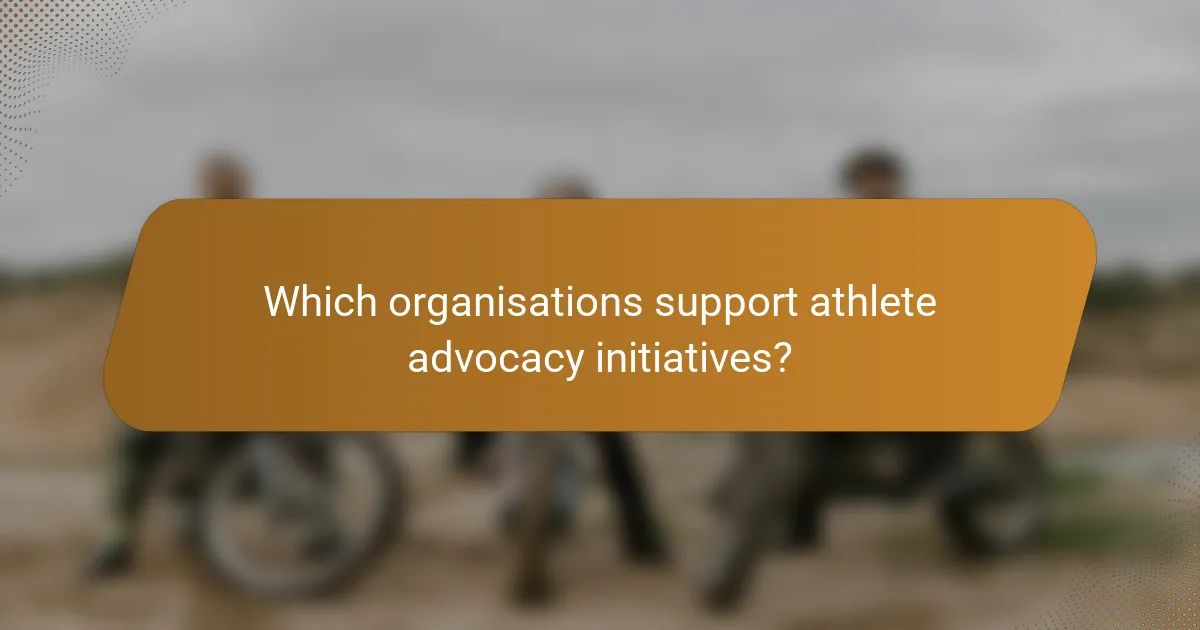
Which organisations support athlete advocacy initiatives?
Several organisations actively support athlete advocacy initiatives, promoting social responsibility in sports. Notable examples include the Professional Athletes Coalition, which focuses on social justice, and the Women’s Sports Foundation, advocating for gender equality. The Athlete Ally organisation champions LGBTQ+ rights in sports, while the Players Coalition works on various social issues. Additionally, the Sports for Change initiative empowers athletes to engage in community service and activism. These organisations provide resources, training, and platforms for athletes to voice their concerns and drive positive change.
How do partnerships enhance advocacy efforts?
Partnerships significantly enhance advocacy efforts by combining resources, expertise, and networks. Collaborative initiatives amplify the reach and impact of campaigns, allowing athletes to address social issues more effectively. For instance, partnerships with non-profits can provide athletes with platforms and tools to engage communities. Additionally, joint efforts can foster greater public awareness and inspire collective action, ultimately leading to more substantial societal change.
What resources are available for athletes looking to advocate?
Athletes can access various resources to advocate effectively. Organisations like the Athlete Ally and the Professional Athletes Coalition provide platforms for athletes to engage in social issues. Additionally, social media offers a powerful tool for outreach and awareness. Workshops and training sessions on advocacy skills are available through sports associations. Networking opportunities with experienced advocates enhance collaboration and impact.

How can athlete advocacy evolve in the future?
Athlete advocacy can evolve by prioritising mental health, environmental sustainability, and social justice. Future initiatives may focus on creating platforms for athletes to voice concerns and collaborate with organisations. Increased use of technology can facilitate real-time engagement with fans and communities. Additionally, partnerships with educational institutions can enhance awareness and promote advocacy training for athletes. As a result, athlete advocacy will become a more integral part of sports culture, reflecting broader societal values.
What trends are emerging in athlete-led social movements?
Athlete-led social movements are increasingly focused on racial justice, mental health awareness, and climate action. Athletes leverage their platforms to advocate for social change, influencing public opinion and policy. A notable trend is the collaboration between athletes and grassroots organisations, enhancing community engagement. For example, initiatives like “Black Lives Matter” have seen significant athlete participation, emphasising the intersection of sports and activism. Additionally, the rise of digital platforms allows athletes to share personal stories, fostering a deeper connection with fans and amplifying their message.
How can technology facilitate athlete advocacy?
Technology can significantly enhance athlete advocacy by providing platforms for communication and engagement. Social media allows athletes to share their causes, reach wider audiences, and mobilise support. Digital tools facilitate real-time data sharing, enabling athletes to present compelling evidence for their advocacy efforts. Furthermore, online petitions and crowdfunding platforms empower athletes to initiate and sustain social change initiatives. By leveraging technology, athletes can amplify their voices and influence public opinion effectively.
What best practices should athletes follow for impactful advocacy?
Athletes should prioritise authenticity, engage their communities, and leverage their platforms for advocacy. Building genuine connections fosters trust and amplifies their message.
1. Identify personal causes: Choose issues that resonate personally to enhance authenticity.
2. Collaborate with organisations: Partner with established groups to gain credibility and resources.
3. Use social media strategically: Share stories and insights to reach wider audiences.
4. Be consistent: Regularly engage in advocacy efforts to maintain momentum and visibility.
5. Educate themselves and others: Stay informed about relevant issues to effectively communicate and inspire action.
6. Lead by example: Demonstrate commitment through actions, not just words, to inspire others.
